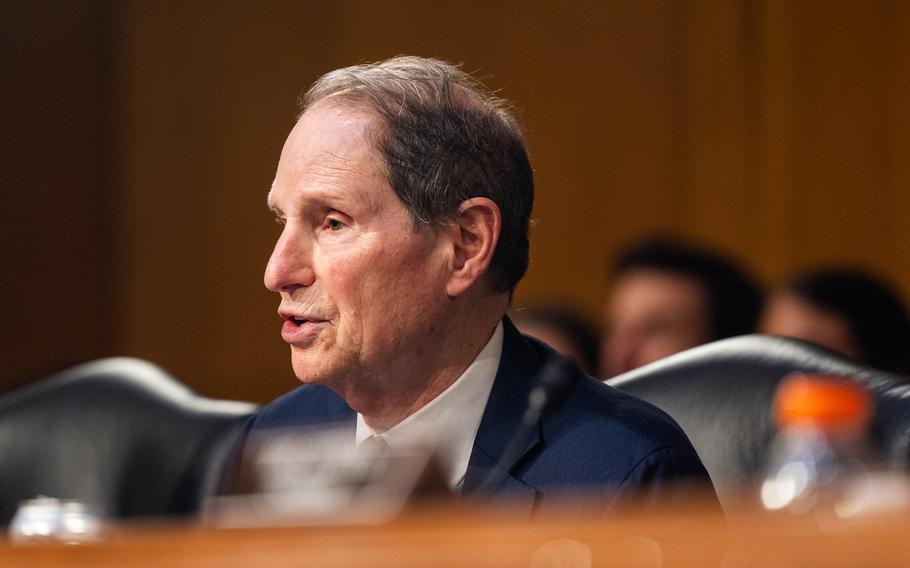
Sen. Ron Wyden (D-Oregon) questions Tulsi Gabbard during a Senate Intelligence Committee hearing Jan. 30 on her nomination to be Director of National Intelligence. (Demetrius Freeman/Washington Post)
Google told The Washington Post Tuesday that the British government has never asked it for special access to users’ private messages and data, after a U.S. lawmaker’s letter drew fresh attention to the issue.
U.S. Sen. Ron Wyden (D-Oregon) sent a letter Tuesday morning asking the Trump administration to ratchet up pressure on the United Kingdom over its alleged digital spying practice. The letter asked Director of National Intelligence Tulsi Gabbard to “conduct and make public an assessment of the national security threat posed by the U.K.’s surveillance laws and its reported secret surveillance demands of U.S. companies.”
In the letter, Wyden reported that Google said it could not tell him whether the British government had demanded special “backdoor” access to users’ private data on its services. That seemed to raise the possibility that Apple, which has said it received such a demand, was not alone.
After this story was first published, Google provided a statement to The Post saying it has neither received nor granted any such access.
It’s the latest twist in a high-profile tussle over the rights of authorities to demand access to otherwise encrypted messages and data.
Apple has publicly fought such attempts for years. In 2016, the company famously refused to help the FBI unlock the iPhone of the suspect in a deadly terrorist attack in San Bernardino, California.
In February, The Washington Post’s Joseph Menn reported that the U.K. Home Office had secretly ordered Apple to create a “back door” giving authorities special access to users’ encrypted messages and data. Apple responded by disabling its most secure data storage option for users in the U.K., while leaving it on for the rest of the world.
Wyden and Rep. Andy Biggs (R-Arizona) first wrote to Gabbard later that month, asking her to demand that the U.K. retract its order. Gabbard agreed that such a back door demand “would be a clear and egregious violation of Americans’ privacy and civil liberties.”
Apple has challenged the order in a British surveillance court.
Wyden’s latest letter suggested that users of Apple products weren’t the only Americans whose privacy might be at stake.
The senator reported that Meta, which offers encrypted private messaging on WhatsApp and Instagram, told his office in March unequivocally that it had not received any backdoor requests from the U.K. government. But the letter said Google had given no such assurances.
“Google also protects Android smartphone backups with end-to-end encryption, and Google has enabled this cybersecurity defense by default, protecting billions of people using Android phones,” Wyden wrote. “When my office asked Google about backdoor demands from the U.K., the company did not answer the question, only stating that if it had received [such a demand], it would be prohibited from disclosing that fact.”
That’s the same response Apple gave previously, according to Wyden’s letter.
Google responded Tuesday to clarify its position.
“We haven’t received a Technical Capabilities Notice,” spokesman Karl Ryan told The Post, referring to the official name for the backdoor request that Apple received from the British government.
“We have never built any mechanism or ‘backdoor’ to circumvent end-to-end encryption in our product,” Ryan added. “If we say a product is end-to-end encrypted, it is.”
Wyden’s letter also raised concerns that a 2016 British surveillance law could allow the country’s authorities to demand that U.S. tech firms store Americans’ data in the U.K. or that they install spyware on Americans’ devices.
Privacy advocates in both countries said the letter revived troubling questions about the extent of British authorities’ alleged snooping powers.
“The U.K. is undermining everyone’s faith in the tech they depend on, by making it impossible to know who is subject to back doors and insecurities ordered by our own government,” said Jim Killock, executive director of Open Rights, a U.K.-based nonprofit focused on digital privacy and free expression.
Matthew Green, a professor of computer science at Johns Hopkins University, called Google’s initial response to Wyden “pretty disturbing.”
“Maybe they’re just being careful,” Green said. “But to me that sounds a little bit like a cry for help.”
Google had initially declined to comment for this story. Meta and Apple declined to comment.
The encryption debate could factor into broader talks between the U.S. and U.K. governments around technology and trade.
Citing anonymous sources, the Financial Times reported this month that the U.K. government was looking for ways to back down from its position on back doors in response to pressure from the Trump administration.
The U.K. Home Office on Tuesday declined to comment on concerns about alleged back door orders to U.S. tech companies, saying,
“We do not comment on operational matters.”
A spokesperson for the office added, “The Data Access Agreement contains critical safeguards to protect the privacy of U.S. citizens anywhere in the world and prevents the U.K. from intentionally targeting the data of anyone located in the US.”
The U.S. Office of the Director of National Intelligence declined to comment.